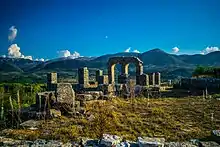Phanote
Phanote or Phanota (Ancient Greek: Φανότη), or Phanoteia (Φανωτεία), was a strongly fortified ancient Greek town of Chaonia located in the region of Epirus.[1] The town's location was of military/strategic importance as it stood in the midst of a valley surrounded by an amphitheatre of mountains, through which there are only two narrow passes. It lies about halfway between the sea and the Antigonean passes, and was therefore of importance to the Romans when they were advancing from Illyria in 169 BCE.[2][3] Its site is tentatively located near the modern Raveni.[4][5]
.svg.png.webp)
Epirus in antiquity

Ruins at the modern Doliani, belonging to the ancient Phanote/Phanoteia
See also
References
Citations
- Hansen & Nielsen 2004, p. 348.
- Livy. Ab urbe condita Libri [History of Rome]. Vol. 43.23.
- Polybius. The Histories. Vol. 27.14.
- Richard Talbert, ed. (2000). Barrington Atlas of the Greek and Roman World. Princeton University Press. p. 54, and directory notes accompanying.
- Lund University. Digital Atlas of the Roman Empire.
Sources
- Hansen, Mogens Herman; Nielsen, Thomas Heine (2004). An Inventory of Archaic and Classical Poleis. Oxford and New York: Oxford University Press. ISBN 0198140991.
 This article incorporates text from a publication now in the public domain: Smith, William, ed. (1854–1857). "Phanote". Dictionary of Greek and Roman Geography. London: John Murray.
This article incorporates text from a publication now in the public domain: Smith, William, ed. (1854–1857). "Phanote". Dictionary of Greek and Roman Geography. London: John Murray.
This article is issued from Wikipedia. The text is licensed under Creative Commons - Attribution - Sharealike. Additional terms may apply for the media files.